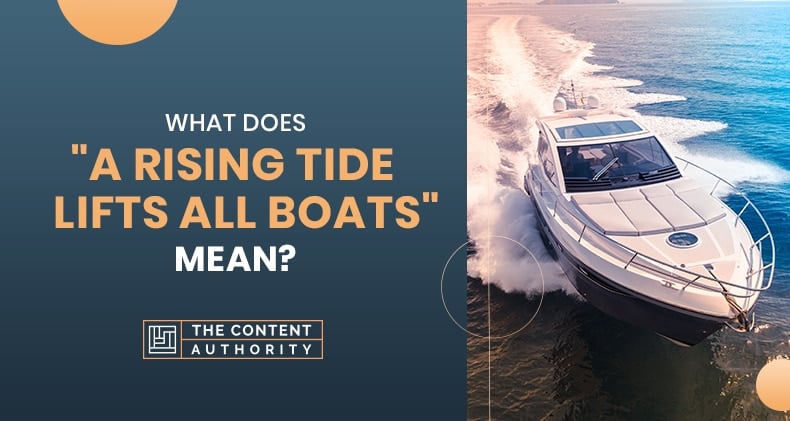It’s always good to add some proverbs to our vocabulary. Using these kinds of idiomatic phrases helps us sound more eloquent and wise but can easily lead to an embarrassing moment if we don’t use them properly. Not to mention, these idioms carry a rich history that is important to preserve by adding them to our daily speech.
This idiom, which was originally popularized by the 35th President of the United States, John F. Kennedy, refers to the idea that when an economy is thriving, it will benefit everyone that operates under it. It is mostly used by economists and politicians, but it is great for everyday use in the right context.
Origin Of The Phrase.
The popularization of this phrase has its origins in the realm of politics. President John F. Kennedy, who popularized it, first debuted this proverbial phrase on October 3rd of 1963 during a speech at an inauguration for a dam project. He was receiving some backlash about this project which he combated by employing this proverb. This phrase is quite often credited to the late President; however, his speechwriter, Ted Sorensen, had stated in his memoir titled: ‘Counselor: A Life At The Edge Of History’ that the original phrase was not coined by him nor by Kennedy. It is said that Sorensen had heard the slogan for the first time at The New England Council, a regional chamber of commerce. There is not a real consensus on who actually coined the idiom originally, though. All that is concretely known about it is that the phrase definitely predates the Kennedy Administration by at least 50 years, as there are records of variations of this saying being used in writing as early as the 1910s, mostly in religious newspapers and bulletins.
Common Use
Thanks to this idiom’s relation to President Kennedy, this phrase has acquired a political nuance. It has been mostly used by politicians and economists to concisely explain an economic theory that states that an improvement in the general economy of a country benefits everyone that participates in it, and therefore, monetary policy should put more focus on broad economic efforts. However, the purpose of a proverb is to make you think deeply about what the metaphor or analogy is trying to communicate; because of this, they are quite versatile in their possible uses.
Despite the saying’s original political use, it can be used in any situation where the core meaning makes sense with the point you’re trying to make. The core message of this proverb outside of the political viewpoint is that any big change in a system benefits everything that operates under that system; it can be in both a positive nuance and a negative one. That being said, it can also be interpreted to relate to the concept of inevitability, as in, the tide lifts the boats whether they like it or not. Though, this alternative interpretation of the idiom is not used very commonly, if at all.

Examples Of Its Common Use
The following are a few examples of its use in everyday conversations:
- “The economy has been doing well, and my business is booming; I guess it is true that the rising tide lifts all boats.“
- “My mom came upset from work today and took it out on us. You know what they say: The rising tide lifts all boats.“
Fun Facts About This Saying.
Back in the 1910s, this phrase was mostly used in religious works. There are many records showing it being featured in Christian bulletins at the time. Here are some of these recorded mentions of the idiom from the 1910s:
- A January 1915 paper titled ‘The man by Man rise of a Race of Men’ from ‘Association Men,’ which was a Young Men’s Cristian Association Movement.
- A paper from January of 1910 from the ‘The New York Christian Advocate,’ titled ‘Never Paralleled in New York.
- Hugh Burleson in ‘The spirit of the Missions’ from May of 1916
Regardless of this, the usage of the idiom by a President changed the context in which it’s now used as well as skyrocketed its popularity. In the matter of a decade, it went from being used as a catchphrase by the vigorous Christian movement of the time to becoming a political slogan for the 35th president of the United States.

Other Idioms
Synonyms/Similar Phrases
It is difficult to give an accurate list of synonyms because this phrase is an idiom. Therefore the meaning is very specific. But, some phrases that have more or less similar meanings are the following:
- We are all on the same boat: this saying and its variations refer to being on the same ‘side’ as someone; that person’s outcome will be the same or similar to yours. However, it is usually used in a negative way.
- If you go down, we all go down: this principle is similar, as it means that if one member of the group suffers a tragedy, they will all suffer the same. It is also mostly used negatively.
- A strong economy benefits individuals: this last one is quite straightforward; when the economy is booming, that will impact the individuals that exist under it. This one has a positive connotation to it.
Examples
The following are examples of these synonyms used in a bit more casual context.
- “You’re the leader of the group! If you go down, we all go down.“
- “We need to do well on this project; we need to get our grades up. We’re all in the same boat, after all.”
- “The teacher will grade us as a group, so if you go down, we all go down.”
Antonyms/ Opposite Phrases
Just as with the synonyms, the antonyms for a proverbial phrase are a bit difficult to pin down since, as mentioned before, the meaning is very specific. Here are a couple of examples of some antonyms for this phrase.
- Rain falls alike on the just and unjust: this one actually comes directly from the bible verse Mathew 5:45. Just like “a rising tide lifts all boats,” it takes on the meaning of a consequence of a change being equal for everyone but twists it into a negative light. The negative consequences (rain) fall on everyone. The usage of this is not casual, though. Rather it is quite formal.
- All who travel in the rain get wet: this last one has pretty much the exact same meaning as the former. The rain (change/negative consequences) is indiscriminate in who it affects.
Examples
An example of one of these antonyms being used in a conversation;
- “Be careful with peer pressure; you know what they say: all who travel in the rain get wet.“
- “For he makes his sun rise on the evil and on the good, and sends rain on the just and on the unjust“

Conclusion
To summarize everything, this phrase describes a big change that influences smaller changes. Over the years, this saying has had many different interpretations by different people, yet, not much is known about the original person that coined it. Both in formal and informal settings and in positive and negative settings, it can be used without problems. It is good to add this, along with other idiomatic phrases, to our everyday vocabulary. You can use them when giving advice to someone, when reflecting on something, or even when you need a metaphor to back up your point!
Shawn Manaher is the founder and CEO of The Content Authority. He’s one part content manager, one part writing ninja organizer, and two parts leader of top content creators. You don’t even want to know what he calls pancakes.

